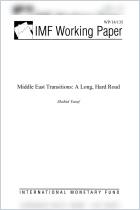Join getAbstract to access the summary!

Join getAbstract to access the summary!
Noah Feldman
The Arab Winter
A Tragedy
Princeton UP, 2020
What's inside?
Learn why the Arab Spring failed – and why it matters anyway.
Recommendation
The Arab Spring uprisings of 2011 electrified the world, but their aftermath – bloodshed, war and a return to autocracy – horrified onlookers. In this thought-provoking text, legal scholar Noah Feldman reflects on the movement’s successes and failures, delivering fresh insights and lucid arguments for the historical and moral significance of the Arab Spring. Readers may disagree with some of his interpretations and conclusions, but those who wish to understand the modern history of the Arab world or the risks of struggles for self-determination will find Feldman’s book essential reading.
Summary
About the Author
Noah Feldman is the Felix Frankfurter Professor of Law at Harvard Law School. He has written many books, including The Three Lives of James Madison, The Fall and Rise of the Islamic State and What We Owe Iraq, and is the host of the podcast Deep Background.

















Comment on this summary